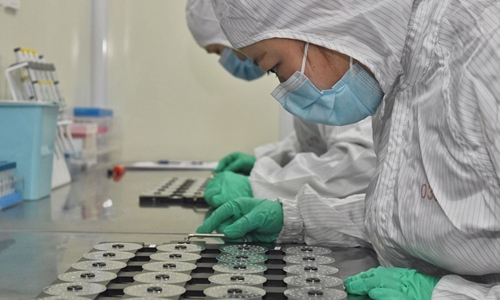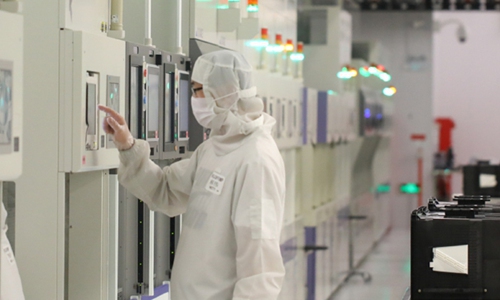SOURCE / INDUSTRIES
China's science academy drafts a plan on key technology innovations

Staff process nucleic acid test chip at the plant of a Chengdu-based biotech company in southwest China's Sichuan Province, Feb. 24, 2020.(Xinhua/Liu Kun)
China will make a new plan of technology innovations, in the areas of supercomputer, key materials and other core technology products which it relies on imports, said the Chinese Academy of Sciences (CAS) on Wednesday in a press release.
"The academy needs to work on the list of materials and technologies over which the US has a stranglehold, such as aviation tires, bearing steel and lithography machines, as well as other core technologies and key raw materials," said Bai Chunli, president of the CAS.
Lithography machine is a key equipment to produce microchips. Self-dependence in the machine production is necessary for China to develop advanced chip-making ability to avoid being squeezed by the US government amid an escalating technology war.
The scientific goal is to make China a leading innovation-oriented country by 2035 and build China into a scientific and technological power by 2050, experts say.
Currently, the supercomputing system developed by CAS has been applied to weather forecast, molecular design, new drug development and atmospheric forecasting, as well as basic research and cosmological research, Bai said.
Responding to the COVID-19 follow-up plan, Bai said the next step is to develop a method that can precisely detect the ill and treat coronavirus patients in the early stage.
In terms of testing reagents, the National Medical Products Administration has approved five rapid testing methods, including nucleic acid testing and antibody testing.
"We will continue to work on this next step, to develop a treatment that can detect all coronavirus cases in their early stages, including antibodies and vaccines," Bai noted.
An affiliated institute of CAS has made a recombinant protein vaccine, which is now in phase II clinical trial and is being planned for phase III trials soon, Bai said.


